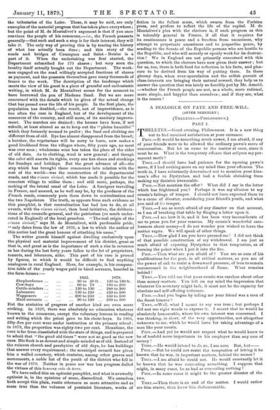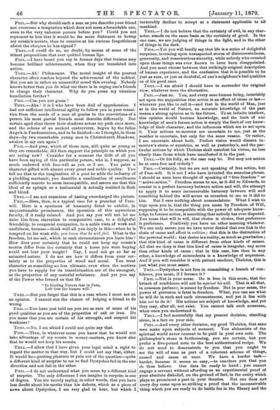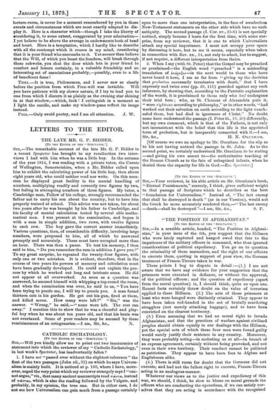(THELETES.—PHILONOMUS.) PART I.
THELETES.—Good evening, Philonomus. It is a new thing not to feel unmixed satisfaction at your entrance. PHIL.—It would be something much newer, I am afraid, if any of your friends were to be allowed the ordinary pawn's move of conversation. But let us come to the matter at once, since it must be so. What is the temporary offence that eclipses my per- manent merit ?
TIIEL.—I should have had patience for the opening pawn's move, if I had nothing more on my mind than your offences. The truth is, I have reluctantly determined not to mention your kins- man's offer to Dystyches, and had a foolish shrinking from making my decision irrevocable.
PHIL.—Not mention the offer ? What did I say in the letter which has frightened you ? Perhaps it was my allusion to my cousin's failings of temper. I should not have expected them to be a cause of disaster, considering your friend's youth, and what you said of his temper.
TIIEL.—I am as much afraid of any disaster on that account, as I am of breaking that table by flinging a letter upon it.
see how it is, and it has been very inconsiderate of me to press you for your reasons. My cousin's wonderful care- lessness about money—I do not wonder you wished to leave the matter vague. We will speak of other things.
THEL.—How glad I am you have pressed me ! I did not think of that possible construction of my withdrawal. I am just as much afraid of exposing Dystyches to that temptation, as of burning the poker when I put it into the fire.
PHIL.—Tllen what are you afraid of ? You are as sure of his qualifications for the post, in all critical matters, as you are of the power of oak to resist a downward pressure, of iron to remain unconsumed in the neighbourhood of flame. What remains behind?
Timr..—You told me that your cousin was careless about other than money-matters. You left on my mind the impression that whatever his secretary might lack, it must not be the capacity for absolute and self-effacing reticence.
PHIL.—And you began by telling me your friend was a man of the finest honour ?
THEL.—Well, what I meant to say was true ; but perhaps I did not use right words to express it. I meant that he would, be absolutely honourable, where his own interest was concerned. I was thinking, in short, of the very opportunities, not altogether unknown to me, which he would have for taking advantage of a man like your cousin.
PIIII..—And yet he would not respect what he would know to be of tenfold more importance to his employer than any sum of money !
THEL.—He would intend to do so, I am sure. But, but-
Pum.—But he could not resist the temptation of letting it be known that he was, in important matters, behind the scenes ?
THEr..—I am afraid he could not. He would constantly let it be known that he was concealing something. I suppose that might, in many cases, be as bad as concealing nothing ?
Pitu..—In some cases it might be the greater disaster of the two.
THEL.—Then there is an end of the matter. I would rather see him starve, than know him dishonourable.
PHIL—But why should such a man as you describe your friend not overcome a temptation which does not seem a formidable one, even to the very unheroic person before you? Could you not represent to him that it would be far more dishonest to betray my cousin's secrets, than to connive at his curious forgetfulness about the cheques be has signed ?
THEL.—I could do so, no doubt, by means of some of the tritest propositions that ever quitted human lips.
PHIL—I have heard you say in former days that truisms may become brilliant achievements, when they are translated into action.
THEL—Ah ! Philonomus. The moral insight of the poorest character often reaches beyond the achievement of the noblest.
But you are in rather an unmerciful mood this evening. Nobody knows better than you do what use there is in urging one's friends to change their character. Why do you press my vicarious humiliation further ?
PHIL—Can you not guess ?
THEL.—Aha ! it is I who have been dull of apprehension. I had not sufficient intellectual agility to follow you in your transi- tion from the needs of a man of genius to the convictions of a person his most partial friends must describe differently. But certain aged elms throw their shadows across my path once more, and the echoes of an ancient controversy, begun by the fallen Angels in Pandemonium, and to be finished—so I thought, in those days—by two remarkable young men in Christchurch Meadows, awaken in my ears again !
PAIL.—And pray, which of those men, still quite as young as they are remarkable, did then support the principle on which you are acting now ? Consider for a moment the drift of all you have been saying of this particular person, who is, I suppose, as much endowed with free-will as you or I are. You paint a character gifted with almost every great and noble quality. You tell me that to the imagination of a poet he adds the industry of a plodding mechanic, you describe a combination of excellences sufficiently remote to seem incompatible, and assure me that this ideal of an epitaph or a testimonial is actually realised in flesh and blood.
THEL.—I am not conscious of having overcharged the picture.
PHIL.—Here, then, is a typical case for a preacher of Free- will. Here is a specimen of humanity fitted to exhibit, in unquestionable prominence, the operation of this mysterious faculty, if it really existed. And you say you will not let me raise him from starvation to comparative ease, to a delightful friendship, to congenial occupation, to a noble vista of work and usefulness, because—think well all you imply in this—when he is tempted on his weak side, you know that le will fail. What is the freedom, let me ask, which in such circumstances you leave him ? How does your certainty that he could not keep my cousin's secrets differ from the certainty that a horse you were buying could not bear your weight? Nay, I need not go so far as animated nature. I do not see how it differs from your cer- tainty as to the properties of wood and metal. You treat character as something no less ultimate, even when the motives you have to supply for its transformation are of the strongest, as the properties of any material substance. And yet you say of the Power who formed us that He
"In binding Nature fast in Fate, Left free the human will."
THEL.—But you forget that this is a case where I must act on an opinion. I cannot run the chance of helping a friend to do wrong.
PHIL.—You have just told me you are as sure of some of his good qualities as you are of the properties of oak or iron. Do you mean that you are certain of his strength, and suspect his weakness?
THEL.—No, I am afraid I could not quite say that.
PHIL—Then, in whatever sense you know that he would not take advantage of my cousin in money-matters, you know also that he would not keep his secrets.
THEL.—I allow that I have given your legal mind a right to regard the matter in that way, but I could not say that, either. It would be—putting pleasure or pain out of the question—quite a different kind of surprise to me to find Dystyches fail in the one direction and not fail in the other.
PHIL.—I do not understand what you mean by a different kind of surprise. The only difference I can imagine in surprise is one of degree. You are merely saying, in other words, that you have less doubt about his merits than his defects, which as a piece of news about Dystyches, I am very glad to hear, but which I
inexorably decline to accept as a statement applicable to all mankind.
THEL.—I do not believe that the certainty of evil, in any char- acter, stands on the same basis as the certainty of good. In the one case, we are judging of things in the light, and in the other of things in the dark.
PHIL.—Yet you will hardly say that life is a series of delightful surprises, in coming upon unsuspected stores of disinterestedness, generosity, and conscientious sincerity, while nobody who counted. upon these things was ever known to have been disappointed.. And you must choose between that strikingly original description of human experience, and the confession that it is possible to be just as sure, or just as doubtful, of one's neighbour's bad qualities as of his good ones.
THEL.—I am afraid I should have to surrender the original view, whatever were the alternative.
PHIL.—Just so. You, and every sane human being, invariably act upon the supposition that action is an effect of cause or law— whatever you like to call it—and that in the world of Man, just as in the world of Nature, an accurate knowledge of the past means a strong opinion as to the future. To an infinite intellect,. this opinion would become knowledge, and the limit of our knowledge of men's future action is simply the limit of our know- ledge of their character, and the influences which are to act upon. it. Your actions to-morrow are uncertain to me, just as the weather is uncertain, but only for the same reason. Or rather,. I am uncertain about both. Perfect vision would discern to- morrow's storm or sunshine, as well as yesterday's, and the par- ticular actions by which Theletes shall manifest his virtue, no less- clearly than those which have manifested it in the past.
TIIEL.—Or his folly, as the case may be. But may not action. be at once free and orderly ?
PHIL—Certainly, but we are not speaking of free action, but. of Free-will. It is not I who have invented the senseless phrase. I should as soon have thought of speaking of " free-freedom " or- " active-action." Freedom seems to me, as it did to Edwards, to consist in a perfect harmony between action and will, the attempt to apply it to some inconceivable harmony between will and• something behind the will seems as senseless to me as it did to• him. But I care nothing about nomenclature. What I wish to urge upon you is, that the thing you mean by Freedom of Will,. supposing it to be compatible with the power of adequate know- ledge to foresee action, is something that nobody has ever disputed. You mean that will is will, that choice is choice, that preference is preference. Positively you have no other meaning whatever_ We can only assure you we have never denied that one link in the chain of cause and effect is volition ; that this is the distinction of the personal world ; that desire is a reality, as much as gravitation ; that this kind of cause is different from other kinds of causes. All that we deny is that this kind of cause is irregular, any more- than other kinds of cause ; that in this case, less than in any other, a knowledge of antecedents is a knowledge of sequences._ And if you will consider it with patient candour, Theletes, this is. just what you must assert.
THEL.—Dystyches is not free in committing a breach of con- fidence, you mean, if I foresee it ?
PHIL—Not in your sense. He is free in this sense, that the- breach of confidence will not be against his will. That is all that, in common parlance, is meant by freedom. But in your sense, the power of prevision is fatal to freedom. What, you can see what he will do in such and such circumstances, and yet it lies with him not to do it His actions are subject of knowledge, and yet they may, after all, not exist. You cannot talk such nonsense,. when once you understand it.
THEL.—I feel mournfully that my present decision, standing alone, is a fact on your side.
PHIL.—And every other decision, my good Theletes, that sane- men make upon subjects of moment. You alchemists of the spiritual world never consent to be paid in your own coin. The philosopher's stone is forthcoming, you are certain, but you prefer a five-pound note to the best authenticated recipe. We do not need to demonstrate to you that you ought ta see the will of man as part of a coherent scheme of things, caused and cause at once. We have a harder task— harder, because it seems so easy,—to convince you that you do thus believe. Our data lie ready to hand ; you cannot engage a servant without affording us an experimental proof of your absolute disbelief, on the ground of fact, in the entity which plays so prominent a part in your theories. But one does not every day come upon so striking a proof that the inconceivable thing which you are ready to do battle for in the library and the lecture-room, is never for a moment remembered by you in those events and circumstances which are most exactly adapted to dis- play it. Here is a character which—though I take the liberty of considering it, to some extent, exaggerated by your admiration—
I yet believe to be above the average in endowments both of head and heart. Here is a temptation, which I hardly like to describe with all the contempt which it rouses in my mind, considering that it is your friend who succumbs to it. Yet sooner than believe that the Will, of which you boast the freedom, will break through these cobwebs, you shut the door which lets in your friend to comfort and leisure certainly, to a valuable friendship and an interesting set of associations probably,—possibly, even to a life of beneficent fame !
THEL.—It is true, Philonomus, and I never saw so clearly before the position from which Free-will was invisible. Will you have patience with my slower nature, if I try to lead you to one from which I discern it as plainly as the evening star shining in at that window,—which, look ! I extinguish in a moment as
I light the candle, and make my window-pane reflect its image instead.
Pau..—Only avoid poetry, and I am all attention. J. W.








































 Previous page
Previous page